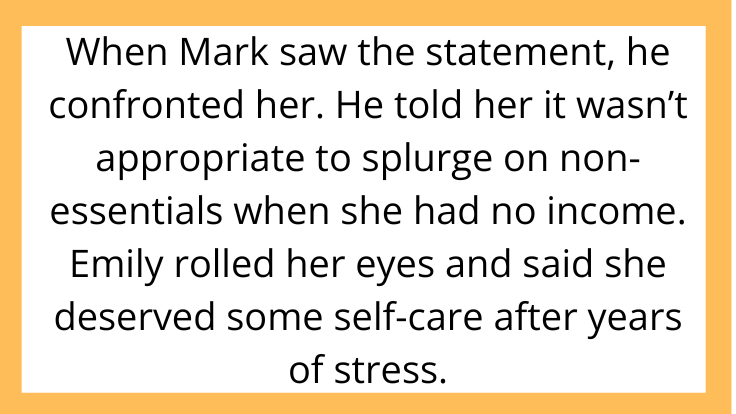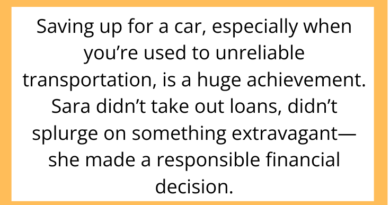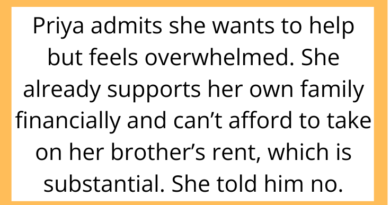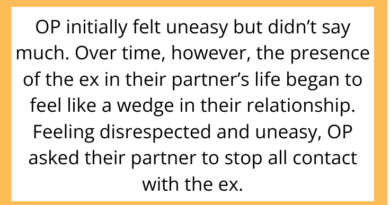AITAH for Refusing to Pay for My Girlfriend’s Shopping After She Quit Her Job Without Telling Me?
Relationships are built on trust, respect, and clear communication—especially when it comes to money. But what happens when one partner makes a major life decision without discussing it, and expects the other to pick up the slack?
Today’s AITAH scenario dives into the fallout when a man draws a financial boundary—and his girlfriend calls him selfish.
The Backstory: A Sudden Decision

The original poster—let’s call him Mark—shared his dilemma on r/AITAH. Mark, 31, has been dating his girlfriend, Emily, 28, for nearly two years. They moved in together six months ago and split household expenses evenly.
Emily worked in a marketing role that she often complained about. According to Mark, she frequently vented about her demanding boss, the long hours, and the lack of growth opportunities. He sympathized but didn’t expect her to make any drastic moves—at least not without a plan.
Then, one Friday evening, Emily casually announced over dinner that she had quit her job earlier that day. She didn’t give notice, didn’t line up a new position, and didn’t discuss it with Mark beforehand.
The Tension Builds: Expecting Financial Support

Mark was stunned. He asked how she planned to cover her share of the rent and bills. Emily assured him it would be fine—she’d just “take some time to decompress” before job hunting. She also assumed he would help cover her usual expenses in the meantime.
A week later, Emily went on a shopping trip with her friends and returned with several bags of clothes, makeup, and accessories. She charged everything to their shared credit card.
When Mark saw the statement, he confronted her. He told her it wasn’t appropriate to splurge on non-essentials when she had no income. Emily rolled her eyes and said she deserved some self-care after years of stress.
Mark refused to pay the bill and told her she needed to cover her own shopping costs. Emily was furious, calling him unsupportive and accusing him of treating her like a burden.
Reddit Weighs In: Is Mark the Villain?

The r/AITAH community quickly jumped in to share their verdict—and most sided firmly with Mark.
Why Mark Is Not the Villain
-
Lack of Communication
Emily made a life-altering decision without any discussion. In a partnership, big financial changes should be mutual decisions. -
Shared Expenses vs. Personal Spending
Mark wasn’t refusing to help with rent or essentials. He only drew the line at discretionary shopping. -
Entitlement
Expecting your partner to fund your lifestyle after you voluntarily quit your job—without warning—shows a lack of respect and maturity.
One popular comment read:
“She’s an adult. You’re not her parent or ATM. You’re her partner. She should have had a conversation with you before making this decision.”
Why Some Think Mark Could Have Been More Supportive
While most agreed Mark wasn’t the villain, a minority felt he could have been more compassionate about her mental health.
-
Burnout Is Real
Quitting a toxic job can be an act of self-preservation. -
Temporary Help
Some suggested Mark could have offered a short-term compromise, like helping with necessities for one month while she regrouped.
But even these commenters agreed that the shopping spree was out of line.
The Bigger Issue: Trust and Shared Responsibility

This isn’t just a story about money—it’s about trust and partnership. When you share a home and finances, your choices affect each other.
Emily’s unilateral decision not only disrupted their budget but also showed she expected Mark to adjust without question. That expectation can breed resentment.
In healthy relationships, big changes like quitting a job should involve:
-
Open Conversations
Discuss the pros and cons before making a move. -
Planning Ahead
Build savings to cushion the impact. -
Shared Agreement
Ensure both partners are on the same page about temporary support.
What Could They Do Now?

For Emily:
-
Reflect on why she didn’t discuss quitting beforehand.
-
Take responsibility for personal spending.
-
Start looking for work sooner rather than later.
For Mark:
-
Be clear about what help he’s willing to offer (e.g., essential expenses only).
-
Set firm boundaries around shared credit cards.
-
Reevaluate financial expectations in the relationship.
Takeaway: Setting Boundaries Doesn’t Make You Selfish

Saying no to funding someone else’s lifestyle—especially after they made a unilateral decision—does not make you heartless. It makes you responsible.
Supporting a partner doesn’t have to mean sacrificing your own financial security or principles. Boundaries protect both people in a relationship.



